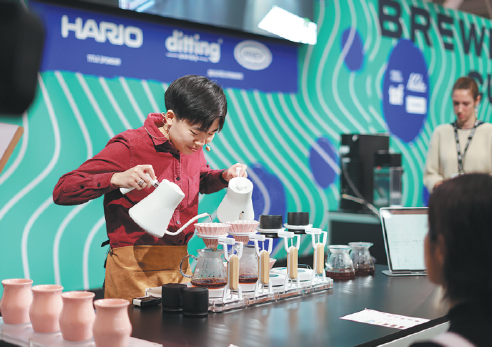
From the People's Daily app.
And this is Story in the Story.
Coffee, the world's second-largest commodity category after crude oil, is becoming more prominent in China as domestic demand grows.
Today, there are roughly 30 million coffee drinkers in China. Analysts have predicted that within the next ten years, the number will grow to 300 million.
According to industry experts, Shanghai is the epicenter of the country's coffee culture. The city holds this distinction largely due to disposable per capita household income, which stands at $8,700, more than twice the national average.
"The improvement of China's national income level is expected to improve per capita coffee consumption,” said a China consultant.
China's annual per capita coffee consumption stands at four cups, meaning the Chinese only consume four cups of coffee a year.
This is expected to grow with experts predicting per capita consumption to reach 40 cups a year within a decade.
Today's Story in the Story looks at China's coffee expansion and how individual brewers are impacting the industry at home and worldwide.

Du Jianing brews four cups of Ninety Plus Gesha Estate coffee at the final round of the Boston World Coffee Championships on April 14. (PHOTO: CHINA DAILY)
While years of training helped her become one of the world's top baristas, for Du Jianing, it all boils down to dedication and teamwork.
The 27-year-old Beijing barista began her coffee career nine years ago. In 2015, she entered the competitive arena, and her journey to the top officially began.
"As a barista, I brew coffee, sharing the flavors and stories behind them. This is why I love coffee because it is all about sharing," Du said while competing in the finals at the 2019 World Brewers Cup Championships in Boston, Massachusetts.
For her final presentation, she brewed four cups of coffee for the judges in under 10 minutes.
The judges graded her skills and then enjoyed the coffee with her as if they were at her coffee shop in Nanjing, Jiangsu Province.
Representing China, the presentation helped Du win the championship. It was her first win after three separate attempts.
Previously, she finished 15th in Ireland in 2016 and 8th in Brazil in 2018. With her third appearance and subsequent victory, she became the first Chinese to win the championship.
Before her presentation, Du ground the coffee beans twice-first crushing them loosely into large lumps before grinding them into fine particles-it makes the coffee evenly distributed and the removal of the silver skin covered pieces before the second grind makes the cup clean with more explicit flavors.

Du is the first Chinese winner of the World Brewers Cup Champion. (PHOTO: CHINA DAILY)
Brewing the coffee was exciting to watch.
Du was the only one who used both hands to pour the water while altering the decanter speed.
According to her mentor Zhang Yinzhe, Du spent an entire year learning how to pour hot water using two hands so she could make four cups of coffee, one for her, and three for the judges.
"Most baristas use the 10 minutes to make the coffee and describe the flavors, and the judges drink it afterward. But she reduced the preparation time so she and the judges could drink together while she explained the flavors,” Zhang said.
"Please swirl the vessel gently a few times. You will find yourself immersed in delicate, velvety floral aromas before being overwhelmed by apricot and cocoa notes, followed by the nice sweet taste of cream," Du told the judges.
Du introduced the coffee flavors in just a few words, the same way she briefly explained her brewing process.
Zhang said her minimal descriptions provided the judges with more time to concentrate on the coffee.
"In previous competitions, Du would explain as much as she could, but we realized it was a burden on the listeners, so we decided less is more," said Zhang.
The final results were announced, starting with the sixth place winner to first place. After the second place finalist was revealed and Du's name had not been called, her team cheered.
"I went blank. I couldn't breathe or hear my team celebrating," Du recalled
Du placed third at the China Barista Championships in 2015. The following year, she won the China's Brewers Cup, gaining the only spot that would allow her to compete on the world stage.
However, she realized there was a gap between her and other top baristas at the World Brewers Cup in 2016. She took a year off and worked as the team’s assistant so others could compete.
In 2018, Du returned to competition. She was national champion again and ranked eighth in the world. She was two places away from the final. One month later, she started to compete in the national competition to earn her spot in Boston, Massachusetts.
After winning the world championships, Du was invited to participate in several national coffee events. However, after five years of competition, she felt she had completed a stage in her life.
"The next step will be related to coffee, but I need some time to figure out what it will be,” Du said.
(Produced by Nancy Yan Xu, Lance Crayon, Brian Lowe and Paris Yelu Xu. Music by: bensound.com. Text from China Daily and Global Times.)


